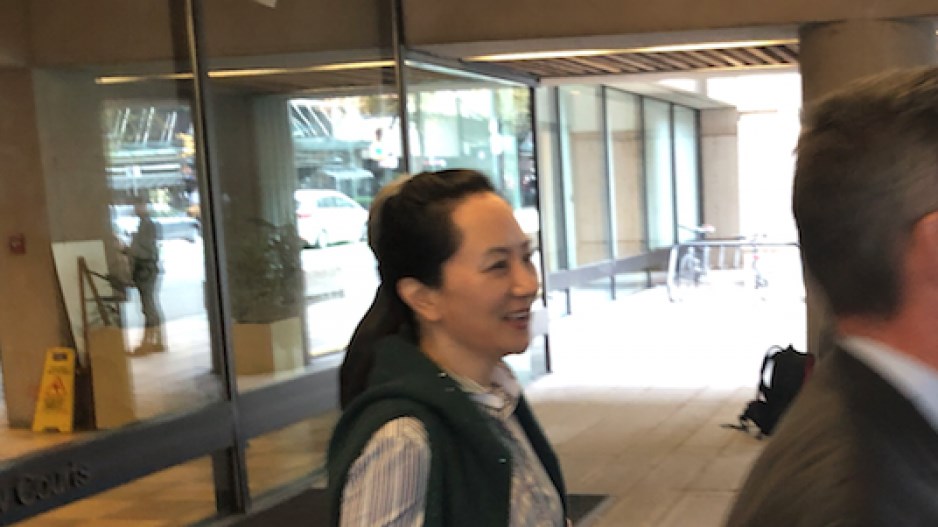The defence of Huawei Technologies CFO Meng Wanzhou has formally asked the judge to discharge her from extradition proceedings based on a lack of evidence.
The bid was made at the end of the final arguments of Meng’s lawyers, when attorney Eric Gottardi made the request.
Gottardi’s argument - as is the argument of fellow defence lawyers Scott Fenton earlier - is that the United States’ Record of the Case (ROC) was inaccurate and manifestly unreliable in places while completely lacking in primary facts in others.
Gottardi accused the Crown of resorting to “educated guesses and speculation” to fill key gaps that would be needed to prove Meng knowingly lied to HSBC to get the bank’s continued services.
“Here we are, eight years later [after Meng’s 2013 presentation to HSBC] trying to sift through to ROC to devine what possible deception was uttered - and what risk, if any, flowed directly from any… lies or omission,” Gottardi said. “… There are inferences that the requesting state seeks to have you [the court] to draw, and we say there is not enough primary evidence.”
The court now awaits the Crown’s final counter arguments, to be presented by prosecutor Robert Frater, on Wednesday.
Earlier today, defence lawyers went after the Crown’s interpretation of “deprivation law” – the requirement of what a victim must suffer in order for the case to qualify as fraud.
Defence lawyer Scott Fenton began the last argument of the Meng team in final committal, criticizing Crown counsel’s stance that HSBC was a victim of fraud – committed allegedly by Meng – because Meng misrepresented Huawei’s business in Iran.
Fention, in his presentation this morning, called the Crown's case "a no-evidence case" for what the defence described as a complete lack of proof that a) Meng's actions led directly to HSBC possibly violating U.S. sanctions, b) HSBC suffered any loss or risk-of-loss that qualified it as a fraud victim and c) Huawei actually violated U.S. sanctions at all.
"What a requesting state [for extradition] has to supply in this court - in accordance with Canadian fraud law - is actual evidence that in continuing that business, the bank was placed at a tangible, concrete risk of pecuniary loss that's grounded in evidence," Fenton said. "It's not enough to say, 'They [HSBC] took some economic action independent of [Meng's] statements.'
"In sum, it is our submission that the [U.S. Record of the Case] simply failed to deliver any actual evidence that provides a causal nexus that you [presiding judge Heather Holmes] would require between Ms. Meng's alleged representations and any tangible risk of pecuniary loss by the bank on any of its loan facilities."
The Crown has repeatedly made the point that Meng’s misrepresentations made in 2013 led to HSBC continuing its banking relationship with Huawei, thus putting it at risk of penalties levied by the United States for violating sanctions against Iran.
Fenton, however, told BC Supreme Court associate chief justice Holmes that several case precedents demonstrate that the Crown’s definition of “deprivation” – of the loss suffered by HSBC due to Meng’s alleged actions – is not enough to trigger fraud charges against the Chinese tech executive.
“It’s simple,” Fenton said. “There has to be proof – grounded in evidence – of actual loss or tangible or concrete risk of loss on the part of the victim. Nothing less will suffice.”
In all of the case precedents brought forward by the Crown, Fenton noted, the risk of loss was either concrete enough to come with other fixed monetary loss or other obvious risks of financial loss that would be suffered by the victims. Neither of those aspects exists in the Meng case, he added.
Fenton pointed out that HSBC did not suffer fines or penalties from U.S. regulators, and the remote chance that the U.S. could have taken actions against the bank is too abstract to qualify as “deprivation,” meaning fraud cannot be established.
"The risk cannot be zero," he concluded.
Today’s argument follows several days of defence arguments indicating that Meng has shifted strategy from attacking improper conduct by police and border agents during her 2018 arrest in Vancouver to disproving the validity of U.S. fraud charges against them.
The committal hearings are expected to conclude by Friday.




